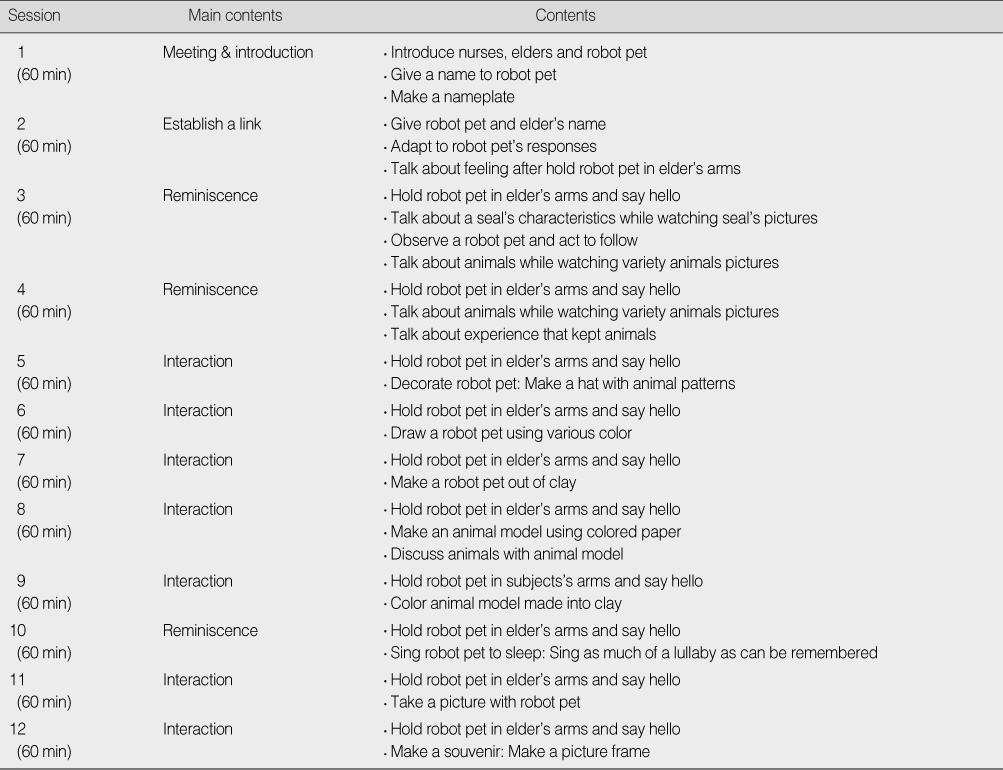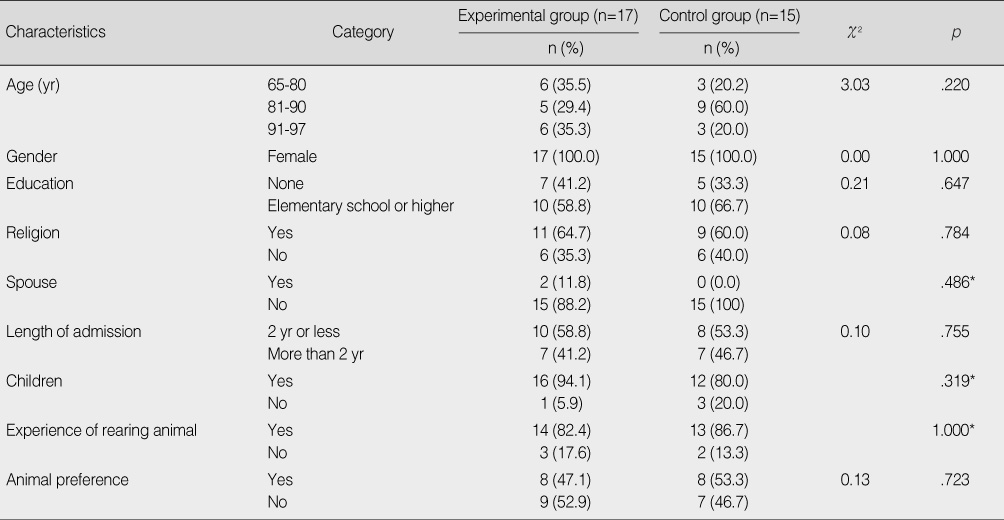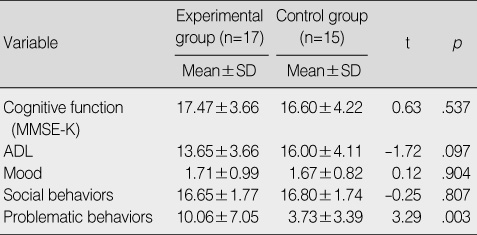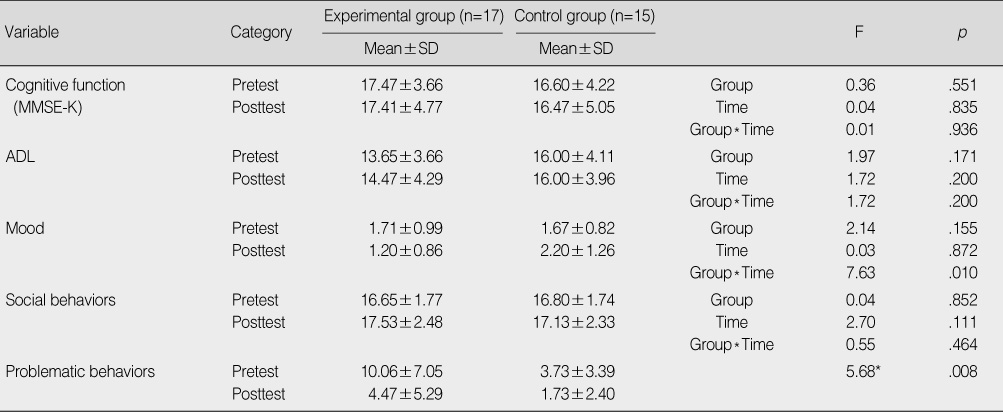Articles
- Page Path
- HOME > J Korean Acad Nurs > Volume 39(4); 2009 > Article
-
Original Article
- Effects of a Robot Pet-assisted Program for Elderly People with Dementia
- Jung Hee Song
-
Journal of Korean Academy of Nursing 2009;39(4):562-573.
DOI: https://doi.org/10.4040/jkan.2009.39.4.562
Published online: August 31, 2009
Full-time Lecturer, Department of Nursing, Kimcheon Science College, Gimcheon, Korea.
- Address reprint requests to: Song, Jung Hee. Department of Nursing, Kimcheon Science College, 480 Samrak-dong, Gimcheon 740-703, Korea. Tel: 82-54-420-9216, Fax: 82-54-420-9279, sjh1994@hanmail.net
Copyright © 2009 Korean Society of Nursing Science
Abstract
-
Purpose
- The purpose of this study was to identify the effects on the cognitive function, Activities of Daily Living (ADL), mood, social behaviors, and problematic behaviors of robot pet-assisted program for elderly people with dementia.
-
Methods
- This study was a nonequivalent control group pretest-posttest design. The participants were 32 elders with dementia. Seventeen were assigned to the experimental group and 15 to the control group. The intervention was conducted twice a week for 6 weeks.
-
Results
- 1) After the program, cognitive function, ADL, and social behaviors did not show significant differences. 2) After the program, mood of experimental group was significantly better than that of the control group. 3) After the program, problematic behaviors of the experimental group were significantly more diminished than those of control group. 4) As a result of analyzing the response, robot pet-assisted program was effective such as inducing a positive emotional state and increasing communication and interaction.
-
Conclusion
- The robot pet-assisted program was effective in changing the mood and diminishing problematic behaviors and had positive effects such as increasing communication and interaction for elders with dementia. Therefore, this program should be considered as a positive program for physical and emotional support for elders with dementia.
- 1. Banks MR, Banks WA. The effects of animal-assisted therapy on loneliness in an elderly population in long-term care facilities. Journal of Gerontology. 2002;57A:M428–M432.
- 2. Brodie SJ, Biley FC. An exploration of the potential benefits of pet-facilitated therapy. Journal of Clinical Nursing. 1999;8:329–337.ArticlePubMedPDF
- 3. Brodie SJ, Biley FC, Shewring M. An exploration of the potential risks associated with using pet therapy in healthcare settings. Journal of Clinical Nursing. 2002;11:444–456.ArticlePubMed
- 4. Bruck L. Todays ancillaries, part 2: Art, music and pet therapy. Nursing Homes. 1996;45(7):36–45.
- 5. Cohen J. Statistical power analysis for behavioral sciences. 1988;New York, NY, Academic Press.
- 6. Dan JW, Lee JM. The effect of group fine art therapy program on the improvement of perceptive ability and communications of with the demented elderly. Journal of Welfare for the Aged. 2006;33:71–102.
- 7. Dastoor DP, Norton S, Boillat J, Minty J, Parpadopoulou F, Muller HF. A psychogeriatric assessment program I. social functioning and ward behavior. Journal of the American Geriatrics Society. 1975;23:465–471.ArticlePubMed
- 8. Farina A, Arenberg D, Guskin S. A scale for measuring minimal social behavior. Journal of Counselling Psychology. 1957;21:265. Article
- 9. Folstein MF, Folstein SE, McHugh PR. "Mini mental state": A practical method for grading the cognitive state of patients for the clinician. Journal of Psychiatric Research. 1975;12:189–198.ArticlePubMed
- 10. Kim JS, Jung JS. The effects of a folk play program on cognition, ADL, and problematic behavior in the elderly with dementia. Journal of Korean Academy of Nursing. 2005;35:1153–1162.ArticlePubMedPDF
- 11. Kim KA. Development of an assessment tool of problematic behaviors for institutionalized old people with dementia. 2003;Seoul, Seoul National University. Unpublished doctoral dissertation.
- 12. Kim PY. A study of comparison on the effects of horticultural, music and art therapy for dementia patient. Korean Nurse. 2001;40:51–63.
- 13. Kim SM, Lee YJ, Yu SJ, Park MJ, Kim EJ, Jeong ES. The effect of physical activity program on sleep and behavior of institutionalized dementia patients. Journal of KoreanAcademy of Psychiatric and Mental Health Nursing. 2003;12:340–348.
- 14. Kim YS, Doh BN. Effects of the group art therapy program with reminiscence on cognitive function, depression and quality of life of demented elderly. Korean Journal of Art Therapy. 2005;12:483–500.
- 15. Population projections for Korea: 2005-2050 (Based on the 2005 Census). Korea National Statistical Office. 2006;12;Retrieved October 1, 2007. from http://www.nso.go.kr# National.
- 16. Lee DK. A study on the entertainment robot behavioral structure and reactive motion design-With emphasis on developing pet robot behavioral structure and reactive motion design management tool. 2003;Daejeon, Korea Advanced Institute Science and Technology. Unpublished master's thesis.
- 17. Mahoney FI, Barhel DW. Functional evaluation: The Barthel index. Maryland State Medical Journal. 1965;14:61–65.Article
- 18. Motomura N, Yagi T, Ohyama H. Animal assisted therapy for people with dementia. Psychogeriatrics. 2004;4:40–42.Article
- 19. Seal type robot "Paro" to be marked with best healing effect in the world-new version of "Paro" to be lease from AIST venture. National Institute of Advanced Industrial Science and Technology (NIAIST). 2004;09 17 Retrieved June 1, 2007. from http://www.aist.go.jp/aist_e/latest_research/2004/20041208_2/20041208_2.html# National.
- 20. Paro found to improve brain function in patients with cognition disorders. National Institute of Advanced Industrial Science and Technology (NIAIST). 2006;02 13 Retrieved June 1, 2007. from http://www.aist.go.jp/aist_e/latest_research/2006/20060213/20060213.html# National.
- 21. Park JH, Kwon YC. Korean Version of Mini-Mental State Examination (MMSE-K)-Part 1: Development of the test for the elderly. Journal of the Korean Neuropsychiatric Association. 1989;28:125–135.
- 22. Park JH, Shon HS, Cho SW. Reliability of functional status measurements in elderly people. Journal of the Korean Neuropsychiatric Association. 1995;34:475–483.
- 23. Shibata T. Robot living together with human beings the onward advancement of intelligent system technology-World's most therapeutic robot "mental commit robot". AIST Today International Edition. 2003;9:2–3.
- 24. Shin SJ. A study on the effectiveness of therapy dog assisted program through repeated interventions for the autistic children. Korean Journal of Social Welfare. 2001;45:250–287.
- 25. Shin SJ, Jung SH. The effects of therapy dog-facilitated program on the improvement of social functioning for the schizophrenics. Mental Health & Social Work. 2000;10:85–112.
- 26. So HY, Whang IO. The effects of multidimensional program on cognition, physical function and depression for institutionalized elderly. Korean Journal of Rehabilitation Nursing. 2006;9:72–80.
- 27. Sparrow R. The march of the robot dogs. Ethics and Information Technology. 2002;4:305–318.ArticlePDF
- 28. Tamura T, Yonemitsu S, Itoh A, Oikawa D, Kawakami A, Higashi Y, et al. Is an entertainment robot useful in the care of elderly people with severe dementia. Journal of Gerontology. 2004;59A:83–85.
- 29. Velde BP, Cipriani J, Fisher G. Resident and therapist views of animal-assisted therapy: Implications for occupational therapy practice. Australian Occupational Therapy Journal. 2005;52:43–50.Article
- 30. Wong DL, Baker CM. Pain in children: Comparison of assessment scale, Pediatric. Nursing. 1988;14:9–17.
- 31. Yang HK. The effects of the recreational music therapy on the cognitive functional of the aged people with dementia. Journal of the Korea Gerontological Society. 2006;26:749–765.
REFERENCES
Figure & Data
REFERENCES
Citations

- Digital interventions to reduce social isolation and loneliness in older adults: An evidence and gap map
Vivian Welch, Elizabeth T. Ghogomu, Victoria I. Barbeau, Sierra Dowling, Rebecca Doyle, Ella Beveridge, Elisabeth Boulton, Payaam Desai, Jimmy Huang, Nour Elmestekawy, Tarannum Hussain, Arpana Wadhwani, Sabrina Boutin, Niobe Haitas, Dylan Kneale, Douglas
Campbell Systematic Reviews.2023;[Epub] CrossRef - Digital healthcare for dementia and cognitive impairment: A scoping review
Minsung Sohn, JungYeon Yang, Junyoung Sohn, Jun-Hyup Lee
International Journal of Nursing Studies.2023; 140: 104413. CrossRef - Systematic review and meta‐analysis of randomization controlled and nonrandomized controlled studies on nurse‐led nonpharmacological interventions to improve cognition in people with dementia
Yujin Suh, Sumi Lee, Go‐Eun Kim, JuHee Lee
Journal of Clinical Nursing.2023; 32(13-14): 3155. CrossRef - The use of technology for social interaction by people with dementia: A scoping review
Merryn Anderson, Rachel Menon, Katy Oak, Louise Allan, Matthew Chua Chin Heng
PLOS Digital Health.2022; 1(6): e0000053. CrossRef - Socially assistive robots for people with dementia: Systematic review and meta-analysis of feasibility, acceptability and the effect on cognition, neuropsychiatric symptoms and quality of life
Clare Yu, Andrew Sommerlad, Lena Sakure, Gill Livingston
Ageing Research Reviews.2022; 78: 101633. CrossRef - Can Use of Digital Technologies by People with Dementia Improve Self-Management and Social Participation? A Systematic Review of Effect Studies
David Neal, Floor van den Berg, Caroline Planting, Teake Ettema, Karin Dijkstra, Evelyn Finnema, Rose-Marie Dröes
Journal of Clinical Medicine.2021; 10(4): 604. CrossRef - Pet-Assisted Therapy for Delirium and Agitation in Hospitalized Patients with Neurocognitive Impairment: A Review of Literature
Abu Baker Sheikh, Nismat Javed, Katarina Leyba, Ali Hamza Khair, Zainab Ijaz, Aimen Asim Dar, Hamza Hanif, Asif Farooq, Rahul Shekhar
Geriatrics.2021; 6(4): 96. CrossRef - Factors related to the effectiveness in the use of an ICT-based toy robot for the in-home care of community dwelling elderly
Heui Sug Jo, Ji Hee Kim, Saerom Kim
Korean Journal of Health Education and Promotion.2019; 36(5): 43. CrossRef - Effects of Intervention Using PARO on the Cognition, Emotion, Problem Behavior, and Social Interaction of Elderly People with Dementia
In Soon Koh, Hee Sun Kang
Journal of Korean Academy of Community Health Nursing.2018; 29(3): 300. CrossRef - Prospects of Geriatric Nursing Application Based on Robot Technology
Jin Hwan Oh
Journal of Korean Gerontological Nursing.2018; 20(Suppl 1): 127. CrossRef - Interaction of robot with humans by communicating simulated emotional states through expressive movements
Sara Baber Sial, Muhammad Baber Sial, Yasar Ayaz, Syed Irtiza Ali Shah, Aleksandar Zivanovic
Intelligent Service Robotics.2016; 9(3): 231. CrossRef - Effects of Silver-Care-Robot Program on Cognitive Function, Depression, and Activities of Daily Living for Institutionalized Elderly People
Jin-Hwan Oh, Yeo-Jin Yi, Chul-Jin Shin, Cheonshu Park, Sangseung Kang, Jaehong Kim, In-Sook Kim
Journal of Korean Academy of Nursing.2015; 45(3): 388. CrossRef - Care robots for the supermarket shelf: a product gap in assistive technologies
TIM BLACKMAN
Ageing and Society.2013; 33(5): 763. CrossRef - Effects of Multisensory Stimulation Using Familiarity: Persons with Dementia in Long-term Care Facility in Korea
Gwi-Ryung Son Hong
Journal of Korean Academy of Nursing.2011; 41(4): 528. CrossRef
Contents of Robot Pet-assisted Program
Homogeneity Test for General Characteristics
*Fisher's exact test.
Homogeneity Test for Dependent Variable between Experimental and Control group
MMSE-K=Korean version of Mini-Mental State Examination; ADL=Activities of Daily Living.
Cognitive Function, ADL, Mood, Social Behaviors and Problematic Behaviors for Experimental Group and Control Group
*F value of ANCOVA with pretest problematic behaviors as covariate.
MMSE-K=Korean version of Mini-Mental State Examination; ADL=Activities of Daily Living.
*Fisher's exact test.
MMSE-K=Korean version of Mini-Mental State Examination; ADL=Activities of Daily Living.
*F value of ANCOVA with pretest problematic behaviors as covariate. MMSE-K=Korean version of Mini-Mental State Examination; ADL=Activities of Daily Living.
 KSNS
KSNS
 E-SUBMISSION
E-SUBMISSION




 Cite
Cite

